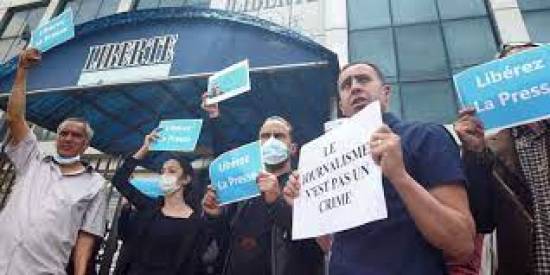Algerian press protests shock imprisonment of journalist Featured
Algerian journalists raised concerns about press freedom in their country after the surprise incarceration on Thursday, September 8, of Belkacem Houam. Mr. Houam, from the Arabic-language daily Echorouk, was imprisoned following an article about the recall of "deglet nour" dates, particularly in France, due to the presence of a pesticide banned in the European Union.
The article, published on September 7, reported criticism from exporters – whose names weren't disclosed – about the management of pesticide use by the authorities. It also mentioned that a decision to stop the "immediate" export of dates was taken by the ministry of trade, which quickly reacted by denouncing an article with "baseless information detrimental to the country's economy and wealth." This was followed by the announcement of "all necessary measures against the author of the article and the newspaper, including judicial proceedings before the competent courts."
The newspaper Echorouk was stopped from printing at the state printing press
The clarifications from the ministry of trade and, subsequently, the ministry of agriculture seemed sufficient to close the matter. But things unexpectedly got out of hand. While the newspaper Echorouk was stopped from printing at the state printing press on September 8, Mr. Houam was summoned to court and placed in pretrial detention in the El Harrach prison in Algiers.
Read more Algeria: Journalist Ihsane El-Kadi sentenced to six months in prison
Up to 30 years in prison
The news of his detention has generated widespread shock. "A journalist should never go to prison for this," said the Twala news website. Meanwhile, Khaled Drareni, a representative of Reporters Without Borders (RSF) in North Africa, called for the release of the journalist, pointing out that the Algerian Constitution states that "the violation of press laws cannot be punished by a custodial sentence." "It is the physical integrity of the journalist that is immediately at stake," wrote Ihsane El-Kadi, director of Radio M and Maghreb Emergent, who was sentenced to six months in prison in June for an opinion piece on the place of the Islamo-conservative movement Rachad in politics.
We are interested in your experience using the site.
Send feedback
Mr. Houam is being prosecuted under a law "on the fight against illegal speculation." Enacted in December 2021 during the Covid-19 crisis, it targets in particular "the dissemination of false or defamatory news or information knowingly, in order to cause a disruption of the market and a sudden and unjustified rise in prices." He faces up to 30 years in prison. Appalled by the news, journalists called for a rally at the Abdelkader-Safir press house in Kouba, Algiers, on September 14.
The former minister of communication, Abdelaziz Rahabi, said he was "shocked," when the case should have been treated in the same way as "all media in the modern world." The detention of a journalist for information of a "purely commercial nature," said Mr. Rahabi, reflects the "persistent political instrumentalization of justice belonging to another age." For the former minister, this is not an isolated act, but a policy that reduces media to being simply "a spokesman for the regime, without real impact on a well-informed public opinion that is more globalized than its leaders."
LE Monde


